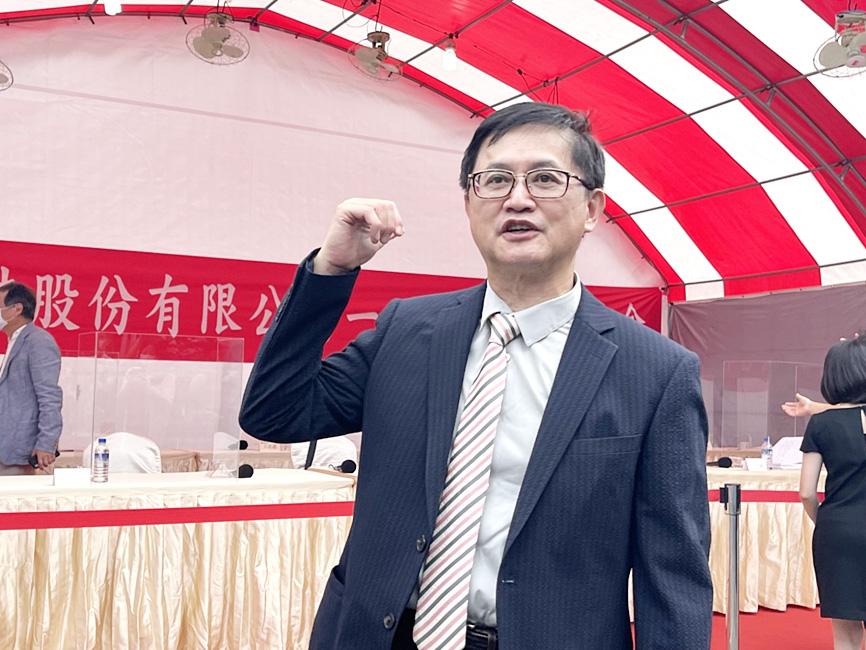Shortages of key components and raw materials remain Pegatron Corp’s (和碩) greatest challenges, but the situation is expected to ease in the second half of the year, the company said yesterday.
Speaking at the firm’s annual general meeting in Taipei’s Beitou District (北投), Pegatron chief executive officer Liao Syh-jang (廖賜政) said that production cannot keep up with orders.
“We’ve been working with customers and suppliers, even using capacity at our subsidiary to help out,” Liao said. “The shortage of components and raw materials is our greatest challenge, but our orders are very strong.”

Photo: CNA
The Apple Inc assembly partner is looking to improve the utilization rate at its factories to alleviate shortages and meet demand, Liao said.
“I believe the situation will improve in the second half of the year from the first half,” he said.
Effects of the COVID-19 pandemic have slowed production at Pegatron plants in Malaysia and Vietnam, although the facilities have been operating at least 60 percent of capacity, Liao said.
Pegatron would continue expanding its production capacity worldwide, Liao said.
“In addition to expanding our Taiwanese facilities, Pegatron is looking to increase production in Vietnam, India and North America to prepare for future demand,” he said.
Describing problems to keep up with orders as a “sweet burden,” Pegatron chairman Tung Tzu-hsien (童子賢) said that the company is cautiously considering investments, as it is trying to avoid making hasty decisions to expand amid the current red-hot market situation.
“Our investment decisions need to make sense in the long term. New facilities take 10 years to amortize costs,” Tung said. “We need to carefully evaluate how much of the demand is real, how much of it is transitory and how much of it is not real demand, but the result of panic buying.”
Tung described the electric vehicle (EV) market as “full of future promise.”
“We are still at the initial stage of EV development, but the next 10 years hold exciting developments,” he said. “Pegatron is looking to find reliable clients to approach the EV market together.”
Once Pegatron has established itself in the EV market, the firm’s gross profit should be better than in existing mature or highly competitive sectors, he said.

Taiwan will prioritize the development of silicon photonics by taking advantage of its strength in the semiconductor industry to build another shield to protect the local economy, National Development Council (NDC) Minister Paul Liu (劉鏡清) said yesterday. Speaking at a meeting of the legislature’s Economics Committee, Liu said Taiwan already has the artificial intelligence (AI) industry as a shield, after the semiconductor industry, to safeguard the country, and is looking at new unique fields to build more economic shields. While Taiwan will further strengthen its existing shields, over the longer term, the country is determined to focus on such potential segments as

UNCERTAINTY: Innolux activated a stringent supply chain management mechanism, as it did during the COVID-19 pandemic, to ensure optimal inventory levels for customers Flat-panel display makers AUO Corp (友達) and Innolux Corp (群創) yesterday said that about 12 to 20 percent of their display business is at risk of potential US tariffs and that they would relocate production or shipment destinations to mitigate the levies’ effects. US tariffs would have a direct impact of US$200 million on AUO’s revenue, company chairman Paul Peng (彭雙浪) told reporters on the sidelines of the Touch Taiwan trade show in Taipei yesterday. That would make up about 12 percent of the company’s overall revenue. To cope with the tariff uncertainty, AUO plans to allocate its production to manufacturing facilities in

COLLABORATION: Given Taiwan’s key position in global supply chains, the US firm is discussing strategies with local partners and clients to deal with global uncertainties Advanced Micro Devices Inc (AMD) yesterday said it is meeting with local ecosystem partners, including Taiwan Semiconductor Manufacturing Co (TSMC, 台積電), to discuss strategies, including long-term manufacturing, to navigate uncertainties such as US tariffs, as Taiwan occupies an important position in global supply chains. AMD chief executive officer Lisa Su (蘇姿丰) told reporters that Taiwan is an important part of the chip designer’s ecosystem and she is discussing with partners and customers in Taiwan to forge strong collaborations on different areas during this critical period. AMD has just become the first artificial-intelligence (AI) server chip customer of TSMC to utilize its advanced

While China’s leaders use their economic and political might to fight US President Donald Trump’s trade war “to the end,” its army of social media soldiers are embarking on a more humorous campaign online. Trump’s tariff blitz has seen Washington and Beijing impose eye-watering duties on imports from the other, fanning a standoff between the economic superpowers that has sparked global recession fears and sent markets into a tailspin. Trump says his policy is a response to years of being “ripped off” by other countries and aims to bring manufacturing to the US, forcing companies to employ US workers. However, China’s online warriors